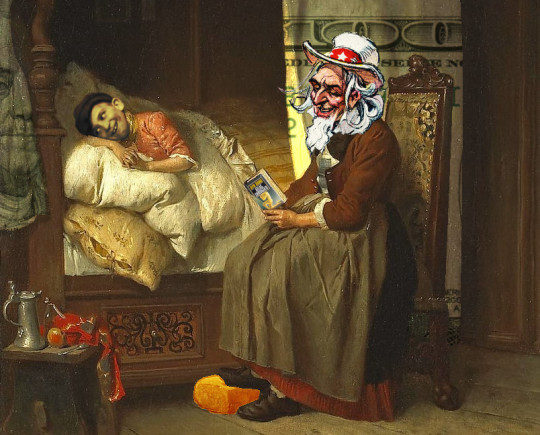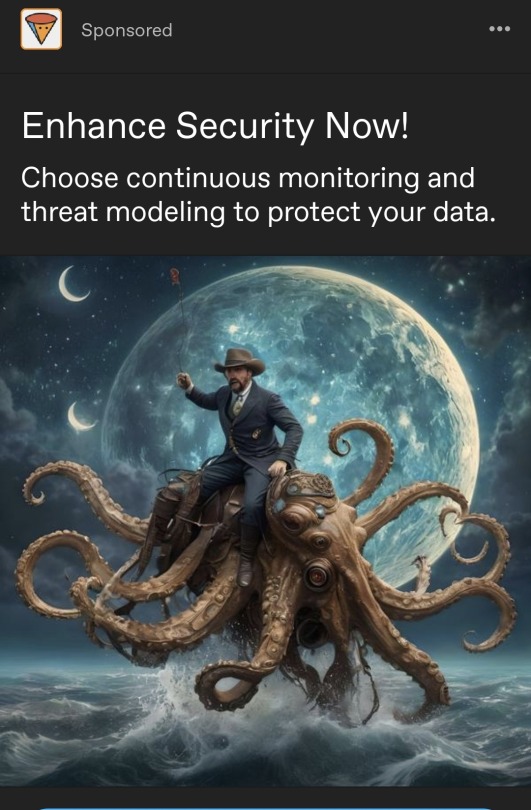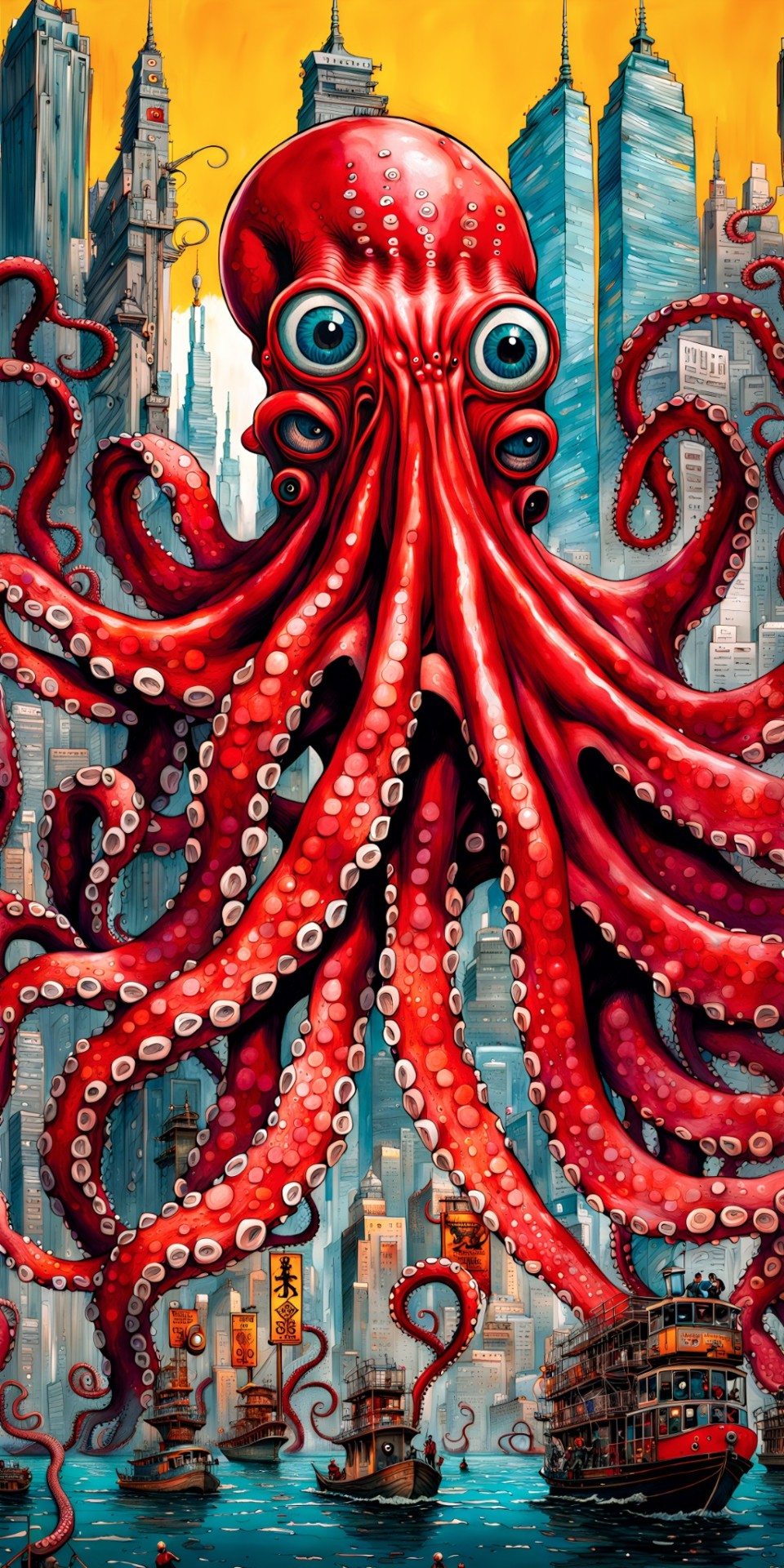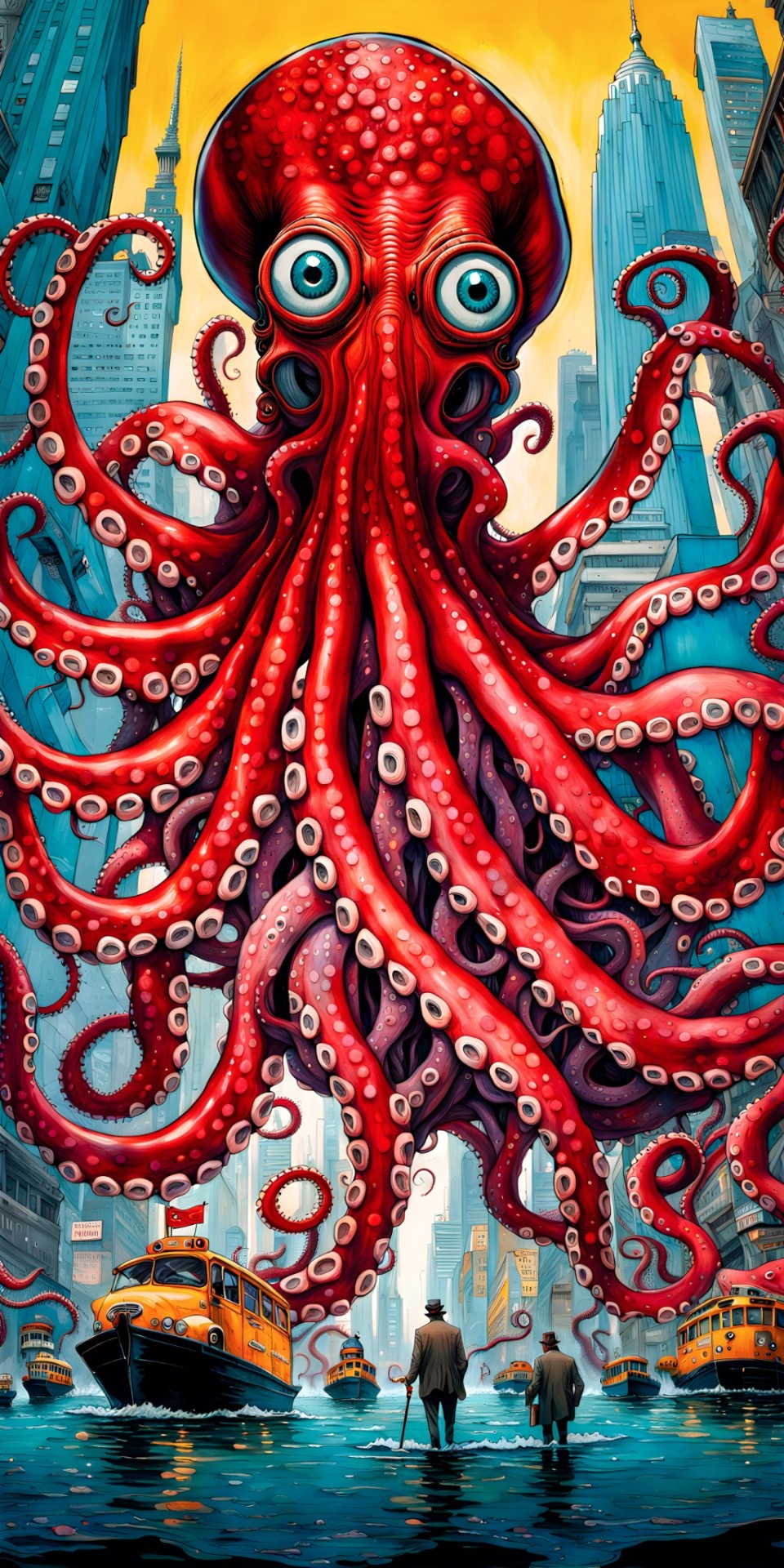#octopus ais
Explore tagged Tumblr posts
Text
I tried something new!

Usually when I edit photos I'm aiming to make things as life-like as possible but I've recently decided to challenge myself to play with color and different tools in PhotoPea. I'm really excited with how this one came out.
I used color to alpha (a lot), hue/saturation, color balance, invert colors, and posterize in a bunch of different layered iterations for different parts of the image til I ended up with the final piece, which I'm really delighted by.
The original photo is of a ruby octopus I got to see this summer while doing research.
Want a print?
Photo prints, shipped to the US, fulfilled by me: https://shop.noncompliantcyborg.com/products
Specialty Prints (canvas, metal, acrylic, etc) and/or photo prints shipped internationally: https://www.inprnt.com/gallery/noncompliantcyborg/ruby-octopus-rainbow-spiral/
#octopus#cephalopod#ocean art#art print#marine science#underwater#sea creatures#ocean#marine biology#my art#small business#not ai art#photopea#inprnt#science art#marine science art#rainbow#lisa frank vibes
198 notes
·
View notes
Text

of tales wild and untold - 2020
#air dry clay#creature#handmade#natural history#not ai art#ooak#polymer clay#mixed media#maximalism#ellen jewett#wabisabi#cephalopod#clay#birbs#bird art#birds#nature#clay art#art#artwork#artists on tumblr#pop surrealism#sculpture#octopus
78 notes
·
View notes
Text




#sage the ai#metal sonic#sonic the hedgehog#mimic the octopus#whisper the wolf#surge the tenrec#memes#sonic memes#sth#sth meme
67 notes
·
View notes
Text

you know what they say about still waters. no. i don't.
#touchstarved game#ais touchstarved#touchstarved ais#red spring studios#touchstarved fanart#fanart#digital art#my art#touchstarvedgame#look at me#drawing ais and it's not even his birthday#love when my men come as part octopus
253 notes
·
View notes
Text
How America's oligarchs lull us with the be-your-own-boss fairy tale

If you'd like an essay-formatted version of this post to read or share, here's a link to it on pluralistic.net, my surveillance-free, ad-free, tracker-free blog:
https://pluralistic.net/2024/02/16/narrative-capitalism/#sell-job

Capitalism is a vibes-based system. Sure, we all know about Keynes's "Animal Spirits" that see "bulls" and "bears" vying to set the market's future, but beyond that, there's just a hell of a lot of narrative.
Writing for The American Prospect, Adam M Lowenstein reviews two books that tell the histories of the stories that are used to sell American capitalism to the American people – the stories that turn workers into "temporarily embarrassed millionaires":
https://prospect.org/culture/books/2024-02-16-stories-corporations-tell-williams-waterhouse-review/
The first of these books is Taming the Octopus: The Long Battle for the Soul of the Corporation, by Kyle Edward Williams, a kind of pre-history of "woke capitalism":
https://wwnorton.com/books/9780393867237
Taming is a history of the low-water marks for Big Business's reputation in America, and how each was overcome through PR campaigns that declared a turning point in which business leaders would pursue the common good, even at the expense of their shareholders' interests.
The story starts in the 1950s, when DuPont and other massive firms had gained a well-deserved reputation as rapacious profit-generation machines that "alienated workers and pushed around small businessmen, investors, and consumers." This prompted DuPont's PR chief, Harold Brayman, to write a memo called "The Attack on Bigness," where he set out a plan to sell America on a new cuddly image for corporate giants.
For Brayman, the problem was that corporate execs were too shy about telling their social inferiors about all the good that businesses did for them: "The businessman is normally reluctant to talk out loud. He frequently shuns the spotlight and is content with plugging his wares, not himself."
This was the starting gun for a charm offensive by American big business that included IBM president Thomas Watson Jr ("I think there is a world market for about five computers") going on a speaking tour organized by McKinsey & Co, where he told audiences that his company's billion dollar annual profits had convinced it to assume "responsibilities for the broader public welfare."
This set the template for a nationwide mania of "business statesmanship" that Fortune celebrated with an editorial announcing "a great transformation, of which the world as a whole is as yet unaware" that put the "profit motive…on its last leg."
Fortune then spent the next seventy years recycling this announcement, every time the tide went out on business's popularity. In 2019, Fortune platformed IBM president Ginni Rometty for an announcement that the company was orienting its priorities to the public good: "It’s a question of whether society trusts you or not. We need society to accept what it is that we do."
The occasion for Rometty's quote was a special package on the Trump tax-cuts, a trillion-dollar gift to American big business, which lobbyists for the Business Roundtable celebrated with an announcement that American capitalism would now serve "stakeholders" (not just shareholders). Fortune celebrated this "change" as "fundamental and profound."
Fast forward five years and corporate leaders are still telling stories, this time about "stakeholder capitalism" and "ESG" – the dread "woke capitalism" that has right-wing swivel-eyed loons running around, hair afire, declaring the end of capitalism.
For Williams and Lowenstein (and me), all this ESG, DEI, and responsible capitalism is just window dressing, a distraction to keep the pitchforks and torches in people's closets, and to keep the guillotines in their packaging. The right-wing is doing a mirror-world version of liberals who freak out when OpenAI claims to have built a machine that will pauperize every worker – assuming that a PR pitch is the gospel truth, and then repeating it in criticism. Criti-hype, in other words:
https://sts-news.medium.com/youre-doing-it-wrong-notes-on-criticism-and-technology-hype-18b08b4307e5
Think of ESG: the right is freaking out that ESG is harming shareholders by leaving hydrocarbons in the ground to appease climate-addled greenies. The reality is that ESG is barely disguised greenwashing, and it's fully compatible with burning every critter that died in the Mesozoic, Cenozoic, and lo, even the Paleozoic:
https://pluralistic.net/2022/03/15/sanctions-financing/#profiteers
The reason this tactic is so successful is that Americans have also been sold another narrative: that American problems are solved by American individuals as entrepreneurs and businesspeople, not as polities or as members of a union (let alone the working class!).
This is the subject of the second book Lowenstein reviews, One Day I’ll Work for Myself: The Dream and Delusion That Conquered America, by Benjamin Waterhouse:
https://wwnorton.com/books/one-day-ill-work-for-myself/
A keystone of American narrative capitalism is the idea that the USA is a nation of small businesspeople, Jeffersonian yeoman farmsteaders of the US economy. But even a cursory examination shows that the country is ruled – economically and politically – by very large firms.
Uber sells itself as a way to be your own boss ("No shifts. No boss. No limits.") – even though it's a system where the app is your boss, and thanks to that layer of misdirection, Uber gets to be the worst conceivable boss, while its workers have no recourse in labor law:
https://pluralistic.net/2023/04/12/algorithmic-wage-discrimination/#fishers-of-men
In labor fights, Uber represents itself as the champion of innumerable "small businesspeople" who drive its unlicensed taxis. In consumer protection fights, Amazon claims to be fighting for "small businesspeople" who sell on its platform. In privacy fights, Facebook claims to represent "small businesspeople" who buy its surveillance advertising.
But large firms are actively hostile to small firms, seeing them as small-fry to be rooked or destroyed (recall that when Amazon targeted small publishers for bankruptcy-level discounts, they called the program "The Gazelle Project" and Bezos told his executives to tackle these firms "the way a cheetah pursues a sickly gazelle").
Decades of this tale have produced "a profound shift from a shared belief that individuals might come together to solve problems, into a collective faith in individual effort." America's long love-affair with rugged individualism was weaponized in the 1970s by corporations seeking to shed their regulatory obligation to workers, customers, and the environment.
As with Big Tech today, the big business lobby held up mom-and-pop businesses as the true beneficiaries of deregulation, even as they knifed these firms. A telling anecdote comes from someone who worked for the Chamber of Commerce's magazine Nation's Business: when this editor pointed out that many of the magazine's subscribers were small businesspeople and asked if they could start including articles relevant to mom-and-pops, the editor in chief said, "Over my dead body."
The neoliberal era has been an unbroken string of platitudes celebrating the small business and policies that annihilate their chances against large firms. Ronald Reagan's dewy-eyed hymns to American entrepreneurship sounded nice, but what matters is that he attempted to abolish the Small Business Administration and refused to address the 20,000 attendee "White House Conference on Small Business."
In the years since, American has sacrificed its small businesses while pulling out all the stops – bailouts and tax cuts and elite bankruptcy – to keep its largest firms growing. New regulations like Dodd-Frank were neutered in the name of saving mom-and-pop shops, even though the provisions that were cut already exempted small businesses.
Today, millions of Americans are treading water in a fetid stew of LLC-poisoning, rise-and-grind, multi-level-marketing, dropshipping and gig-work, convinced that the only way to get a better life is to pull themselves up by their bootstraps:
https://pluralistic.net/2023/04/10/declaration-of-interdependence/
Narrative does a lot of work here. The American economy runs on bubbles, another form of narrative capitalism. Take AI, a subject I sincerely wish I could stop hearing about, not least because I'm certain that 99% of that thinking is being wasted on whatever residue remains after the bubble pops:
https://locusmag.com/2023/12/commentary-cory-doctorow-what-kind-of-bubble-is-ai/
AI isn't going to do your job, but its narrative may convince your boss to fire you and replace you with a bot that can't do your job. Like what happened when Air Canada hired a chatbot to answer customer inquiries and it started making shit up about bereavement discounts that the company later claimed it didn't have to honor:
https://bc.ctvnews.ca/air-canada-s-chatbot-gave-a-b-c-man-the-wrong-information-now-the-airline-has-to-pay-for-the-mistake-1.6769454
This story's been all over the news for the past couple of days, but so far as I've seen, no one has pointed out the seemingly obvious inference that this chatbot probably ripped off lots of people. The victim here was extraordinarily persistent, chasing a refund for 10 weeks and then going to the regulator. This guy is a six-sigma self-advocate – which implies a whole bell-curve's worth of comparatively normal people who just ate the shit-sandwich Air Canada fed them.
The reason AI is a winning proposition for Air Canada isn't that it can do a customer service rep's job – it can't. But the AI is a layer of indirection – like the app that is the true boss of Uber drivers – that lets Air Canada demoralize the customers it steals from into walking away from their losses.
Nevertheless, the narrative that AI Will Change Everything Forever is powerful – more powerful than AI itself, that's for sure. Take this Bloomberg headline: "Nearly all wealth gained by world's rich this year comes from AI":
https://www.business-standard.com/world-news/nearly-all-wealth-gained-by-world-s-rich-this-year-comes-from-ai-124021600006_1.html
Dig in and you find even more narrative. The single largest beneficiary of AI stock gains last year was Mark Zuckerberg ($161B!). Zuck is American Narrative Capitalism's greatest practitioner: the guy who made billions peddling a series of lies, from "pivot to video" to "metaverse," leaping from one lie to the next just ahead of the mass stock-selloffs that wiped out lesser predators.
The Narrative Capitalism Cinematic Universe has a lot of side-plots like AI and entrepreneurship and woke capitalism, but its main narrative arc was articulated, ad nauseum, by Margaret Thatcher: "There is no alternative." This is the most important part of the story, the part that says it literally can't be otherwise. The only way to organize society is through markets, and the only way to organize markets is to leave them alone, no matter how much suffering they cause.
This is a baffling story, because it's so easily disproved. Zuck says the only way to have friends is to let him surveil you from asshole to appetite, even though he once ran Facebook as the privacy-forward alternative to MySpace, and promised never to spy on you:
https://lawcat.berkeley.edu/record/1128876
Likewise, the business leaders – and their chorus of dutiful Renfields – who insist that monopoly is the natural and inevitable outcome of any market economy just handwave away the decades during which anti-monopoly enforcement actually kept most businesses from getting too big to fail and too big to jail.
I'm no champion of market efficiency – especially not as the best and final arbiter of social and economic questions – but when I hear my comrades repeating the Thatcherite claims that all forms of capitalism necessarily degrade into monopolistic quagmires, that there is no alternative, it sounds like more criti-hype.
This is a frequent point of departure during discussions of enshittification: some people dismiss the whole idea of enshittification as "just capitalism." But we had decades of digital services that either didn't degrade, or, when they did, were replaced by superior competitors with a minimum of switching costs for users who migrated from the decaying incumbent to greener pastures.
The reality is that while there are problems with all forms of capitalism, there are different kinds of capitalist problems, and some forms of capitalism are less harmful to working people and more capable of enacting and enforcing sound policy than others.
Enshittification is what happens when the constraints on the worst impulses of companies and their investors and managers are removed. When a company doesn't have competitors, when it can capture its regulators to trample our rights with impunity, when it can enlist those regulators to shut down would-be competitors who might free us from its "walled garden," and when it can fire any worker who refuses to enact harm upon the users they serve, then that company will enshittify:
https://pluralistic.net/2024/01/30/go-nuts-meine-kerle/#ich-bin-ein-bratapfel
A company can be made to treat you well, even if it is run by a wicked person who sees you as a mark to be fleeced – that mustache twirler just has to be constrained – by competition, regulation, self-help and labor. He may still hate you and wish you harm, but he won't be able to act on it.
As MLK said:
It may be true that the law cannot make a man love me, religion and education will have to do that, but it can restrain him from lynching me. And I think that's pretty important also. And so that while legislation may not change the hearts of men, it does change the habits of men. And we see this every day.
#pluralistic#narrative capitalism#oligarchy#temporarily embarrassed millionaires#late-stage capitalism#enshittification#disenshittification#vocational awe#fobazi ettarh#ai#bubbles#bubblenomics#rise and grind#Benjamin C. Waterhouse#One Day I’ll Work for Myself#Kyle Edward Williams#Taming the Octopus#woke capitalism#llcs with mfas
179 notes
·
View notes
Text

What the fuck are you trying to sell me
91 notes
·
View notes
Text



#miles tails prower#tails the fox#sticks the badger#sage the ai#sage sonic#charmy bee#charmy the bee#espio the chameleon#dr starline#starline the platypus#mimic the octopus#infinite the jackal#team garlic#sth#sth meme#sonic memes#memes
109 notes
·
View notes
Text

new minis series! - title TBA
#air dry clay#mixed media#natural history#not ai art#ellen jewett#maximalism#polymer clay#creature#handmade#ooak#wabisabi#artists on tumblr#octopus#pop surreal art#pop surrealism#clay art#art#artwork#sculpture#nature#cephalopod#minitures
27 notes
·
View notes
Text
Meet Mrs. Natalie Nice...

Natalie is a hard worker in one of today's high-end scientific fields. Why, her boss wouldn't know where the test tubes were kept if not for her tireless efforts! Well, not quite tireless...
She's quite tired. Mrs. Nice has been burning the candle at both ends to impress the boss, and she's about to make a terrible mistake because of it.
Can you spot the mistake Mrs. Nice is making?

That's right! Carelessness in the workplace has consequences!
That wasn't coffee! (good) Coffee doesn't glow green!

Whoopsie! Now Mrs Nice is Mrs. Naughty...lus! Nautilus.
And Mrs. Nautilus is not happy!

By not watching what she was doing Natalie has wasted her whole lunch break turning herself into an abomination of science. All without noting dosage, temperature, and other important factors, not to mention completely circumventing the double blind protocol. Her data is completely invalid for the larger project.
Don't be a Mrs. Nautilus, be a Mrs. Nice! Remember:
Take regular breaks, get plenty of rest, and-
-If the Goo's Alight, it's Not alright!
Drinking glowing goo is the 1% cause of monsterism in adults ages 18-35, please science responsibly, a message from your friends at Cocytus Comics.
Each pic used a different prompt around the basic format of:
Secretary with a bob-haircut, redhead, green blouse and pearls, , , comic panel by Jack Kirby and Alex Toth, 1968, in the style of 60s Marvel
a secretary with lavender skin, tentacles for hair, , , comic panel by jack kirby and alex toth, 1968, in the style of 60s marvel
#Mrs. Nautilus & Mrs. Nice#tyrannomax#coctyus comics#ai assisted art#ai edits#dall-e 3#unreality#generative art#workplace safety#monsterism#octopus#cephalopod#mutation
90 notes
·
View notes
Text
every time someone refers to dedf1sh with she/her pronouns instead of they/them ten angels die
#splatoon#dedf1sh#same thing with people calling smollusk 'he'#is it really so hard to use it/its pronouns for a fictional baby ai octopus
35 notes
·
View notes
Text

#basil wolverton#spacehawk#comics#black and white#cosmic horror#retro terror#retro sci fi#cthulhu#lovecraft#vintage ai#👾#👽#squids#octopus#tentacles#alien worlds#alien invasion#alien abduction#insects#dystopia#apocalypse#nasa lies
15 notes
·
View notes
Text

#cute#creepy cute#creepycute#octopus#train#trains#blue#green#nature#animals#cephalopod#tentacles#vintage#steam train#forest#train tracks#aesthetic#dreams#ai#mine#artificiallemonflavor#artificial lemon flavor#ai artwork#artificial intelligence#generative ai#ai generated#ai image#ai art#ai art gallery#ai artist
12 notes
·
View notes
Text

Mud Kraken
The introduction of magic into an ecosystem creates all manner of obnoxious adaptations. Generally, a cephalopod would be happy sticking to the ocean, but the mud kraken instead brings its own ocean with it. It does so by means of planar-gate glands that link directly to the elemental plane of water, which line the creature's skin.
Any material within tentacle's reach rapidly becomes not merely wet, but completely waterlogged. The mud kraken uses this ability to soften material to slither through, and can use it to keep hydrated while running about on its surprisingly strong tentacles.
Mud krakens prefer to hunt by liquefying earth to create patches of quicksand under otherwise normal looking ground. Animals that sink into these pits drown and are later scavenged by the creature.
These creatures would be a deadly menace, if not for their size. Despite their name, the average mud kraken is about a foot wide and feeds on small rodents. Though many an adventurer has turned his ankle painfully in a mud kraken hole.
-
Quartermaster's Guide to the Creatures of Xarthana, pg 74
Prompt: a digital illustration of a land-dwelling squid monster with preying mantis claws, magic the gathering card painting, HQ scan
#monsters#creature design#squid#octopus#cephalopod#unreality#midjourney v6#generative art#ai artwork#xarthana#quartermaster
24 notes
·
View notes
Text

#scifi#octopus#creature#scificharacter#squid#aiart#epic#ai#fantasylandscape#mythology#magic#fantasycharacter#fantasyillustration#horror#art#dark#fantasy#fantasyart#fantasyartwork#mollusks#ship#digitalart#macabre#wallpaper#scifiartwork#scififantasy#scifiart#limbed#noaihaters#dailychallenge
12 notes
·
View notes
Text



Got some 1am Octopus here for ya ya night Owls!! Or for ya non-Mericans! Either way, enjoy, they are here to brighten your day!
Stable Diffusion XL 1.0 - Jellyfish Arcade
#sdxl 1.0#stable diffusion#octopus#octopath#octopi#octopus city#cityscape#dream ai#aiartwork#aiartdaily#ai art gallery#aiartcommunity#midjourney#ai artwork#ai image#generativeart#sci fi
83 notes
·
View notes
Text
Whyyy does so much shit have to be ai generated now??? 😭😭😭
I just want octopus references to draw octopi, so I go to Pinterest and it’s ALL ai garbage. So I go to my web browser and search and at first everything seems fine, normal enough for me to save them, but I go to draw from them and then I see it

Like, this looks fine right? Sure the backgrounds weird, and there’s that one extra suction cup, but maybe someone photoshopped a plain background for this octopus with a mutation. But then I zoom in on the tentacles and suction cups and they are all so wrong. Why the hell are the ones on the right so large and misshapen?? Like there’s a chance this is still just a mutated octopus, but I’m pretty sure it’s ai.

Then there’s this one. Now this is definitely not a real octopus (just given that background and setting) but maybe it’s a life like model someone made. Until you try and understand what that front tentacle is doing and how the hell it’s actually connected to the body. I guess it could just be a really long and conveniently placed tentacle, but to me it just looks like an ai just placed it there. Also wtf is happening with the suction cups, why are some filled in and not hollow, and why are they not in nice rows? I’m pretty sure real suction cups are in nicely organized rows and columns.

And there’s this one, which I already drew and felt like it was real, but now I’m not sure, because it also has weird ass things going on with the suction cups. While I was drawing it I just thought “oh octopi are really flexible so they can probably twist their tentacles like that” but given how they aren’t in an orderly grid I’m skeptical now.
😭😭😭😭😭
8 notes
·
View notes